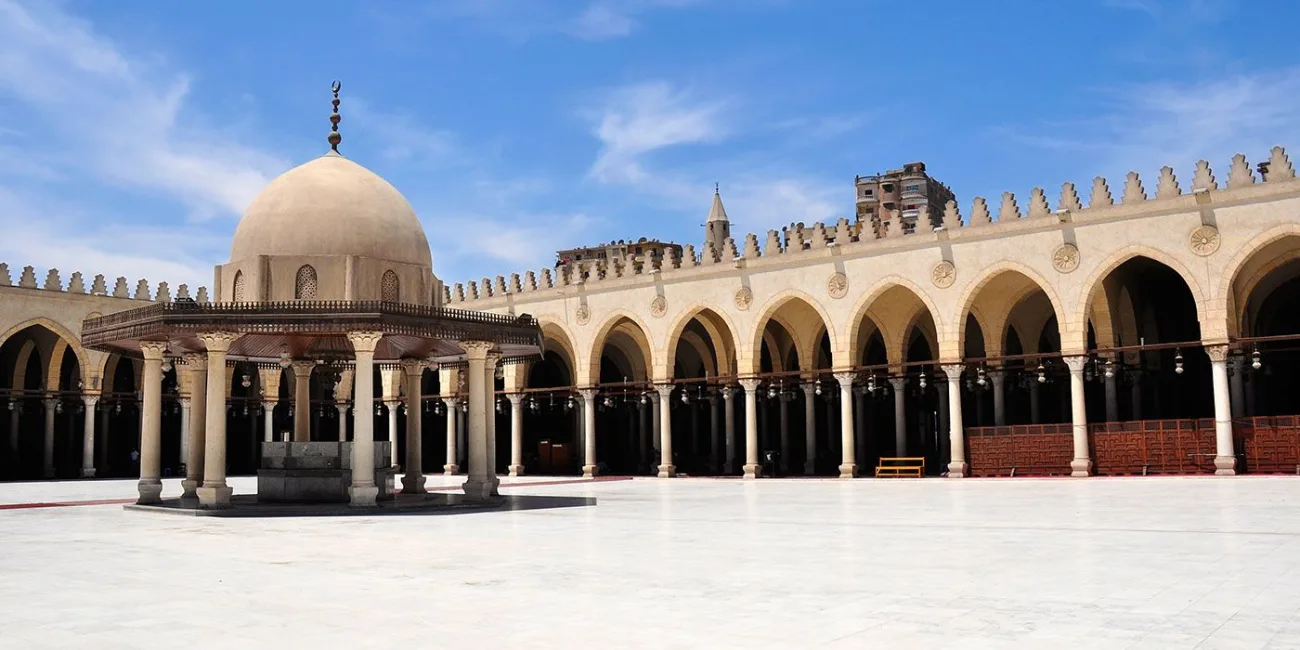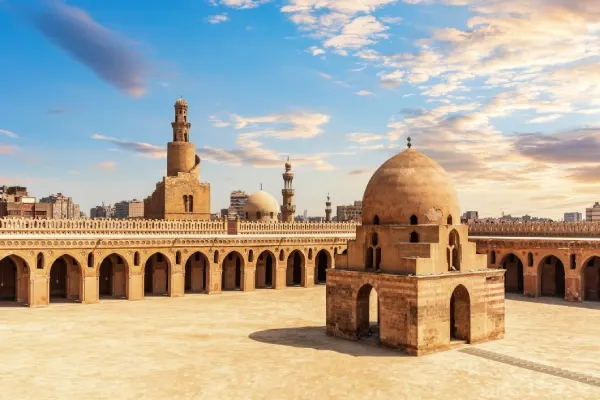Islamic Egypt
Nearly a thousand years of Greco-Roman rule in Egypt came to an abrupt end in 641 AD when an army of Arab Muslims lead by Amr Ibn Al-Aas captured Alexandria. Islam was only a few decades old at the time.

Islamic Egypt is one of the most fascinating chapters in human history—an era filled with dramatic transformations, powerful dynasties, and cultural brilliance. While Egypt is often associated with pyramids, pharaohs, and ancient temples, the Islamic period shaped much of the Egypt travelers experience today—from the winding streets of Old Cairo to the magnificent mosques that crown its skyline.
Beginning in the 7th century, Egypt transitioned from a Byzantine province into one of the most influential centers of the Islamic world. Over the next nine centuries, a succession of caliphates and dynasties left behind breathtaking architecture, vibrant traditions, and institutions that continue to thrive today.
For travelers, students, and history lovers alike, Islamic Egypt offers an unforgettable journey blending spiritual depth, artistic beauty, and rich cultural heritage. This guide aims to take readers through the evolution of this remarkable era—its rulers, cities, monuments, and the living traditions that still shape modern Egypt.
The Dawn of Islamic Egypt (640 CE): A New Era Begins
The Muslim Conquest and the Fall of Byzantine Rule
Islamic Egypt began in 640 CE, when Amr ibn al-As led a modest force of around 4,000 soldiers into the region. Byzantine Egypt was weakened by years of conflict and heavy taxation, and the local Coptic population suffered intense religious persecution. This created an environment ripe for change.
After decisive victories at Pelusium, Bilbeis, and Heliopolis, Muslim forces reached the fortress of Babylon—near today’s Old Cairo—and secured Egypt in 641. Alexandria briefly returned to Byzantine hands in 645, but Amr recaptured it the following year, ending Byzantine control for good.
Fustat: The First Islamic Capital of Egypt
Instead of ruling from Alexandria, Amr ibn al-As founded Fustat, the first Islamic capital near the fortress of Babylon. This new city grew rapidly, built around what is now the Mosque of Amr ibn al-As—Egypt’s first mosque and a major Islamic landmark.
Fustat became a hub for trade, governance, and military organization. Its layout reflected the structure of early Islamic society, with tribal quarters, marketplaces, and administrative districts that shaped Egypt's new identity.
Pragmatic Governance & Cultural Harmony
Amr ibn al-As largely maintained the existing administrative system. Coptic officials kept their jobs, non-Muslims lived under fair taxation, and Arabic slowly replaced Greek as the official language. The early Islamic government promoted stability, cooperation, and gradual cultural transformation—foundations that helped Islamic Egypt thrive for centuries.

The Islamic period in Egypt began in 640 CE, when Arab Muslim forces under Amr ibn al-As conquered Byzantine Egypt and founded Fustat, establishing the first Muslim presence in what would become Islamic Egypt.
1. Egypt Under the Umayyads & Abbasids: Shifting Powers, Lasting Change
Umayyad Governance (661–750 CE)
The Umayyads ruled Egypt from distant Damascus, appointing governors to oversee taxation and security. In 706 CE, Arabic officially became the language of administration, signaling deeper integration with the Islamic world.
However, heavy taxation policies triggered several Coptic revolts, revealing the growing tension between local communities and centralized authorities.
The Abbasid Era (750–868 CE): Reform & Centralization
When the Abbasids took power, they introduced Persian-inspired administrative reforms and emphasized Islamic law. Cairo was not yet the capital; Egypt was still ruled by governors sent from Baghdad.
By the 9th century, Caliph al-Mu‘tasim centralized control further, directing Egypt’s revenue straight to Baghdad and replacing Arab soldiers with Turkish troops loyal only to him. These decisions weakened local autonomy and set the stage for Egypt’s rising independent dynasties.
Customize Your Dream Vacation!
Get in touch with our local experts for an unforgettable journey.
Plan Your Trip
2. The Rise of Autonomous Dynasties: Egypt Finds Its Own Voice
The Tulunids (868–905 CE): Prosperity & Independence
Ahmad ibn Tulun arrived as a governor but soon declared autonomy. He built:
A new capital, al-Qata’i
- The spectacular Mosque of Ibn Tulun
- A powerful local army
- Economic systems that boosted Egypt’s wealth
The Tulunid period marked Egypt’s first strong political identity since ancient times.
The Ikhshidids (935–969 CE): Stability & Leadership
After a short Abbasid resurgence, Egypt regained semi-independence under the Ikhshidids. The standout figure was Kafur, an Ethiopian-born former slave who became the real ruler of Egypt. His leadership ensured stability, economic continuity, and defense against external threats.

3. The Fatimid Caliphate (969–1171): The Birth of Cairo & A Cultural Golden Age
Cairo: A New Capital for a New Empire
The Fatimids, an Ismaili Shia dynasty, conquered Egypt in 969 CE and founded al-Qahira—Cairo, a name meaning “The Victorious.” They built palaces, markets, and the now-iconic Al-Azhar Mosque, which later became the world’s leading center of Sunni Islamic learning.
A Flourishing Age of Tolerance & Culture
The Fatimid period is remembered for:
- Religious tolerance toward Sunnis, Copts, and Jews
- Scientific, artistic, and architectural advances
- Prosperous trade connecting Africa, Asia, and Europe
Even today, Cairo’s Fatimid architecture—narrow alleys, ancient gates, and decorated façades—keeps this era vividly alive.
They founded Cairo, built Al-Azhar, and introduced a golden age of culture, trade, and tolerance.
4. The Ayyubid Dynasty (1171–1250): Saladin & the Rise of Sunni Egypt
Saladin’s Leadership
Salah ad-Din (Saladin) ended the Fatimid caliphate and reestablished Sunni rule. His legacy includes:
- Building the Cairo Citadel, a symbol of strength and strategy
- Unifying Muslim territories against the Crusaders
- Promoting Sunni theological education
The Ayyubid era strengthened Egypt’s military and religious identity.

5- The Mamluk Sultanate (1250–1517): Power, Glory & Monumental Architecture
From Slave Soldiers to Sultans
The Mamluks—military slaves of Turkic and Circassian origin—seized power and established one of the most successful regimes in medieval history. Their rule is divided into:
- The Bahri dynasty (1250–1382)
- The Burji dynasty (1382–1517)
Military Success & Cultural Achievements
The Mamluks stopped the Mongols at the Battle of Ain Jalut (1260) and expelled the last Crusaders from the Levant.
They were also master builders. Cairo’s skyline flourished with stunning mosques, madrasas, and mausoleums such as:
- Sultan Hassan Mosque
- Al-Nasir Muhammad Mosque
- Barquq Complex
These structures remain some of the most breathtaking examples of Islamic architecture worldwide.
Decline & Ottoman Conquest
Plague outbreaks, economic decline, and failure to modernize weakened the Mamluks. In 1517, the Ottomans defeated them, bringing Egypt into a new imperial chapter.
6. Ottoman Egypt (1517–1914): A Blend of Cultures
Egypt flourished as a central province of the Ottoman Empire, absorbing new artistic, architectural, and administrative influences. Cairo continued to grow as a cultural mosaic, blending Ottoman elegance with Mamluk foundations and local traditions.
Elements of Ottoman legacy still shape Egyptian cuisine, music, and urban design today.
Landmarks of Islamic Egypt Every Traveler Should See
Islamic Egypt is filled with world-class attractions, ideal for cultural travelers and history lovers. Key highlights include:
1- Al-Azhar Mosque & University
Founded in 970 CE, it remains the most influential institution in Sunni Islamic learning.
2- Mosque of Amr ibn al-As
The first mosque in Africa and the birthplace of Islamic Egypt.
3- Ibn Tulun Mosque
A breathtaking masterpiece from Egypt’s first autonomous dynasty.
4- Sultan Hassan Mosque
An architectural marvel of the Mamluk age.
5- The Cairo Citadel
Saladin’s fortress, overlooking the city with centuries of history inside.

Islamic Art & Architecture: Beauty in Every Detail
Islamic art in Egypt is known for:
- Geometric designs
- Arabic calligraphy
- Floral motifs
- Precision craftsmanship
Whether carved into wood, stone, or plaster, these elements reflect the spiritual and artistic depth of Islamic civilization.
Egypt’s architectural heritage features:
- Grand domes
- Towering minarets
- Open courtyards
- Ornamental façades
These design elements shaped the identity of Islamic Egypt and continue to influence modern architecture.
Islamic Attractions in Egypt: A Journey Through Living History
Beyond its historical mosques and medieval monuments, Islamic Egypt offers a rich collection of attractions that highlight the country’s spiritual heritage, artistic traditions, and cultural diversity. Many of these landmarks lie in the heart of Historic Cairo, a UNESCO World Heritage Site renowned for its extraordinary concentration of Islamic architecture.
Visitors can explore Al-Muizz Street, one of the oldest streets in Cairo and an open-air museum of Fatimid and Mamluk treasures. Lined with mosques, sabils, palaces, and intricately carved façades, the street offers a vivid glimpse into daily life across centuries of Islamic rule. Nearby, the Khan el-Khalili Bazaar invites travelers into a world of traditional crafts, shimmering lanterns, brass workshops, and aromatic spice stalls, making it one of Egypt’s most vibrant cultural hubs.
Another key attraction is the Citadel of Saladin, home to the magnificent Mosque of Muhammad Ali. Its iconic domes and Ottoman-era design dominate Cairo’s skyline and provide panoramic views across the city. Travelers can also discover the Al-Hussein Mosque, the Sayyida Zainab Mosque, and the Sayyida Nafisa Mosque, each holding deep spiritual significance for Egyptian Muslims and serving as community centers for worship, learning, and celebration.
Together, these attractions reflect the heart of Islamic Egypt—an enduring legacy of devotion, architecture, culture, and everyday life.
Top must-see mosques in Historic Cairo include:
- Al-Azhar Mosque & University — a spiritual and intellectual center.
- Mosque of Amr ibn al-As in Fustat, Egypt’s first mosque.
- Ibn Tulun Mosque, one of Cairo’s oldest and most architecturally significant mosques.
- Sultan Hassan Mosque, a majestic Mamluk-era monument.
- Mosque-Madrasa of Sultan Barquq, combining learning and worship.
Al-Muizz Street is a centerpiece of Islamic Cairo, offering a nearly 1-kilometer stretch of mosques, palaces, sabils, and architectural treasures. Another historic spot is the Khan el-Khalili Bazaar, where medieval trade routes still echo in today’s bustling markets.
- Qalawun Complex: A Mamluk funerary, educational, and healthcare complex.
- Sultan al-Ghuri Complex: Mamluk-era mosque, madrasa, tomb, and water fountain.
- Salihiyya Madrasa: An important center of Islamic learning from the Ayyubid / Mamluk era.
Yes — the Egyptian Islamic Cultural Center in Egypt’s New Administrative Capital is one of the largest and most modern Islamic landmarks in contemporary Egypt.
Absolutely. There are numerous walking tours in Historic Cairo focusing on Islamic heritage, including visits to Al-Azhar Mosque, Khan el-Khalili Bazaar, the Sultan Hassan Mosque, and other medieval landmarks.























